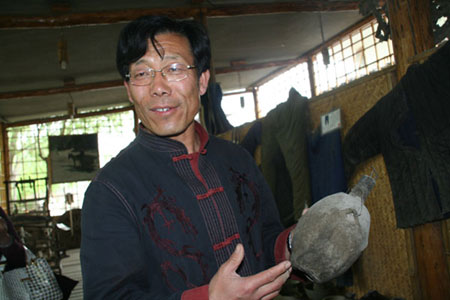Since receiving compensation from the government, Yang has rented almost 600 mu (400,200 square meters) of land for 50 years in Xiaotangshan. There he built his new home and now runs a restaurant named Xiangjulou.
 Yang Delu shows an old water pot made by tung oil (China wood oil) and paper in the Farm Tools Exhibition Hall in Xiaotangshan, Changping District, Beijing, April 24, 2008. [chinadaily.com.cn]
Yang Delu shows an old water pot made by tung oil (China wood oil) and paper in the Farm Tools Exhibition Hall in Xiaotangshan, Changping District, Beijing, April 24, 2008. [chinadaily.com.cn] |
"I'm satisfied with the amount of relocation compensation I got," Yang said, declining to reveal the exact figure.
However, country life in Xiaotangshan couldn't ease Yang's nostalgia for his hometown. "I felt homesick and wanted to recreate Wali here," Yang said.
"I started to collect these things before we relocated," Yang said, "My fellow villagers supported me and donated many items to my exhibition hall."
Olympic complex roots in museum
"All the residents in Wali village dedicated their homes to the 2008 Beijing Olympic Games. And now Wali villagers want to establish the Olympic-Wali Native Land Museum to demonstrate our patriotism and devotion to the Olympics, as well as promote Chinese rural culture," reads Yang's application to the Beijing Municipal government, Changping and Chaoyang districts governments.
Yang, along with his brother and some former village officials, discussed and drafted the application in January 2007. Yang said Wali rural life is an example of Chinese traditional rural culture. The villagers said good-bye to their own nest in Wali but shared a big nest – the Bird's Nest, known as the National Stadium, with the world.
Wali residents left their hometown to make room for Olympic venues, naturally they born a deeper Olympic complex than others, Yang said.
"What I want to do is to provide visitors a 'textbook' about Chinese rural culture," added Yang, "Wherever we move, the history of Wali can't be interrupted. I'm obliged to build the museum because I love my hometown and I know I am doing a right thing."
During his preparations to build the museum, Yang gained solid supports from many people, including his fellow villagers and two-time Olympic shooting champion Yang Ling.
"Yang is a determined and far-sighted man. Whatever difficulties he met, he always works out ways to overcome them," said Wang Shihou, a former Wali village official. "I donated my old hoe to him and most of us villagers supported his idea by offering their used rural stuffs and some old pictures."
"I was moved and inspired by the idea of Yang Ling, two-time Olympic shooting champion who said, ‘Why not duplicate gold medals of all Chinese Olympic champions and display them in a group?' It's a great idea," Yang Delu said.